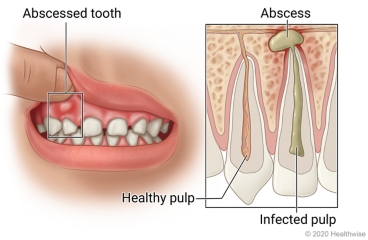Abscessed Tooth in Children: Care Instructions
Overview

An abscessed tooth is a tooth that has a pocket of pus in the tissues around it. Pus forms when the body
tries to fight an infection caused by bacteria. If the pus cannot drain, it forms an abscess. An abscessed
tooth can cause red, swollen gums and throbbing pain, especially when your child chews. Your child may have a
bad taste in their mouth and a fever, and your child's jaw may swell.
Damage to the tooth, untreated tooth decay, or gum disease can cause an abscessed tooth.
An abscessed tooth needs to be treated by a dental professional right away. If it is not treated, the
infection could spread to other parts of your child's body. A dentist will give your child antibiotics to stop
the infection. If antibiotics don't stop the infection, your child may need other treatments.
Follow-up care is a key part of your child's treatment and safety. Be sure to make and go to all
appointments, and call your doctor if your child is having problems. It's also a good idea to know your
child's test results and keep a list of the medicines your child takes.
How can you care for your child at home?
-
Help your child brush and floss gently.
-
Reduce pain and swelling in your child's face and jaw by putting ice or a cold pack on the outside of your
child's cheek for 10 to 20 minutes at a time. Put a thin cloth between the ice and your child's skin.
-
Be safe with medicines. Give pain medicines exactly as directed.
-
If the doctor gave your child a prescription medicine for pain, give it as prescribed.
-
If your child is not taking a prescription pain medicine, ask your doctor if your child can take an
over-the-counter medicine such as acetaminophen (Tylenol) or ibuprofen (Advil, Motrin). Be safe with
medicines. Read and follow all instructions on the label.
-
Give your child antibiotics as directed. Do not stop using them just because your child feels better. Your
child needs to take the full course of antibiotics.
When should you call for help?
 Call 911
anytime you think your child may need emergency care. For example, call if:
Call 911
anytime you think your child may need emergency care. For example, call if:
Call your doctor now or seek immediate medical care if:
Watch closely for changes in your child's health, and be sure to contact your doctor if:
Current as of: August 6, 2023
Content Version: 14.0
Care instructions adapted under license by your
healthcare professional. If you have questions about a medical condition or this instruction, always ask
your healthcare professional. Healthwise, Incorporated disclaims any warranty or liability for your use of
this information.